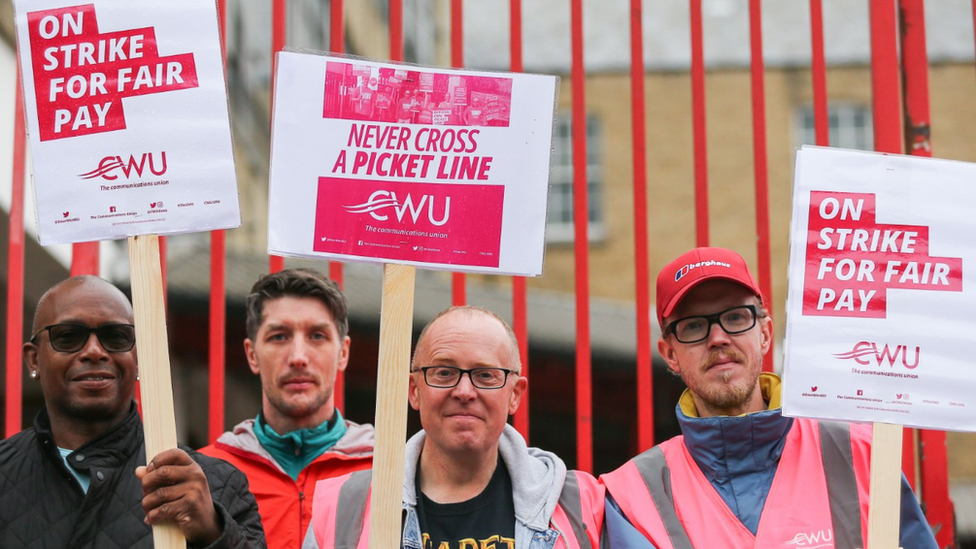Royal Mail to axe up to 10,000 jobs as losses rise
- Published
- comments

Royal Mail has announced plans to cut 10,000 jobs by next August, blaming ongoing strike action and rising losses at the business.
The postal company said it will begin notifying workers of its plan, which includes up to 6,000 redundancies.
Apart from the redundancies, the firm will cut roles through natural attrition, for example by not replacing workers who leave.
Royal Mail also said it expects its full-year losses to hit £350m.
It said this included "the direct impact of eight days of industrial action" as well as lower volumes of parcels being posted.
But the firm warned that losses could reach as much as £450m "if customers move volume away for longer periods" following strike action.
Royal Mail's chief executive Simon Thompson said: "This is a very sad day. I regret that we are announcing these job losses. We will do all we can to avoid compulsory redundancies and support everyone affected."
Royal Mail workers, who are members of the Communication Workers Union, began a fresh round of strikes this week over pay and conditions which will include 19 days of industrial action, including Black Friday.
The next strike date is scheduled for 20 October followed by a further walk-out on 25 October.
The CWU's general secretary, Dave Ward, said Royal Mail's announcement "is the result of gross mismanagement and a failed business agenda of ending daily deliveries, a wholesale levelling-down of the terms, pay and conditions of postal workers, and turning Royal Mail into a gig economy style parcel courier".
But Mr Thompson said on Friday: "Each strike day weakens our financial situation.
"The CWU's decision to choose damaging strike action over resolution regrettably increases the risk of further headcount reductions."
Royal Mail said that if workers go ahead with further walk-outs "the loss for the full year would increase materially and may necessitate further operational restructuring and headcount reduction".
During the first half of its financial year, Royal Mail said strike action cost the business £70m, leading to an operating loss of £219m compared to a £235m profit last year.
But Mr Ward responded: "This announcement is holding postal workers to ransom for taking legal industrial action against a business approach that is not in the interests of workers, customers or the future of Royal Mail. This is no way to build a company."

Julie Macken, co-founder of family-run natural skincare firm Neve's Bees, is fearful of more strikes in the run-up to Christmas
Julie Macken, co-founder of natural skincare firm Neve's Bees, told the BBC the prospects of more strike action "makes me really scared actually".
"It could have a huge impact on our business especially at this time of year. Much of what we sell is gifts and obviously Christmas is a key gifting period for everybody."
Ms Macken, who is also a beekeeper and runs the firm with her family, said the business has already outsourced some of its larger parcel deliveries to a courier business "because Royal Mail was just becoming unreliable and we can't risk losing those packages".
She added: "The system used to work really well - it was reliable, it was good value for money, the people were all really nice. But now I don't feel like I can trust them to give our products to our customers on time anymore."
Royal Mail also revealed that it will have to enter talks with the union because, it said its legacy voluntary redundancy scheme, which offers up to two years' of pay, "is now unaffordable".
International Distributions Services, which is the parent company of Royal Mail, saw its share price tumble by 6.75% to 195p on Friday following the announcement.
The company currently employs 140,000 people. It plans to cut between 5,000 and 6,000 jobs through redundancies. Headcount will be scaled back by a further 4,000 through not replacing people when they leave, cutting temporary staff and reducing overtime.
CWU members are striking over a pay deal Royal Mail offered earlier this year. This is made up of a 2% wage rise. as well as an additional 3.5% increase dependent on workers agreeing to certain conditions such as mandatory working on Sunday to deliver parcels.

Royal Mail workers have staged a number of one-day strikes this year
At the moment, Sunday working is voluntary. Royal Mail also wants employees to start later and finish later to accommodate online shopping habits, where people tend to order goods in the evening or late at night and want next-day delivery.
The CWU has rejected the offer, saying it failed to match rising inflation, which is currently running at a 40-year high of nearly 10%.
Royal Mail has been attempting to make the company a "parcels-led" business as the number of letters being sent through the post declines and more people shop online.
Mr Thompson told the BBC that nearly 20 years ago, Royal Mail delivered 20 billion letters a year. Today, it is eight billion.
"We are now a parcels business that also delivers letters," he said.
Asked whether the current situation was his fault because he had failed to persuade workers of the firm's new direction, Mr Thompson said: "Any change, particularly when you have been doing your working practices for tens of years, is very, very difficult and I think that we all recognise that."
But he added: "We don't want to be a gig economy like our competitors and the irony of our current situation is our customers, our retailers are having to give our work to people that operate a gig economy model. That is not what we want."
Related topics
- Published13 October 2022

- Published1 August 2023
